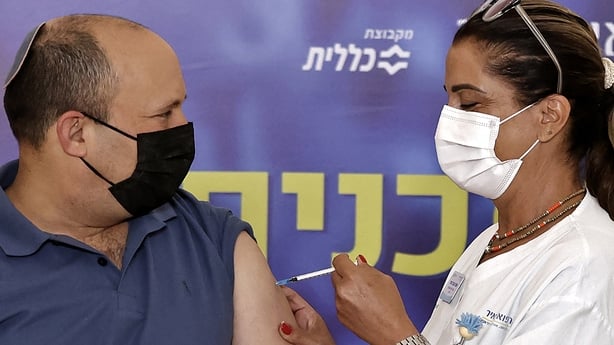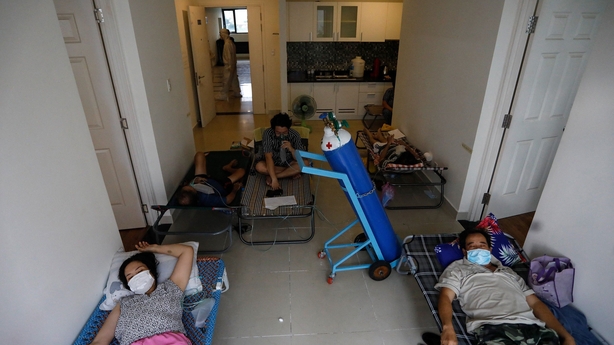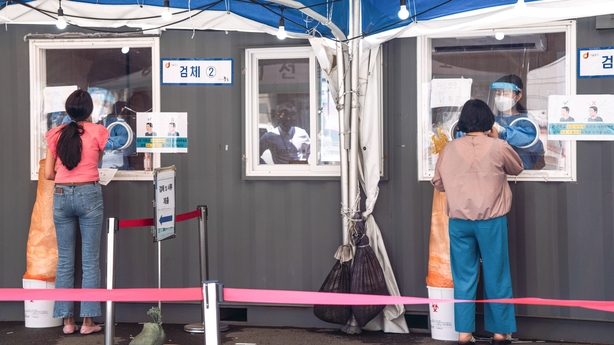A government minister said Portugal decided to ease restrictions on the number of people allowed in restaurants and cultural venues two weeks earlier than planned, as the vaccination campaign moved faster than expected.
Cabinet Minister Mariana Vieira da Silva said the number of people allowed to sit together inside restaurants or cafes rose from six to eight and from 10 to 15 to sit outside.
Cultural events, weddings and christenings can fill up to 75% of venue capacity, up from 50%. Cultural venues, restaurants, and other businesses can remain open until 2am.
«The epidemic is not over yet,» she told a news conference. «It surprised us with new variables that we did not expect. It is our responsibility to continue monitoring its development and maintain the behaviors necessary to control the epidemic.»
Negative tests or digital certificates remain a requirement for indoor dining on weekends and holidays, and hotel accommodations.
Portugal ramped up its vaccination campaign over the summer after a slow start, with a delta-type surge in June alarming authorities after high levels of infection earlier this year.
Cases have stabilized since the end of July at around 3,000 a day. Government data showed that the reproduction rate rose slightly but remains below 1, indicating a slowdown in the spread of the epidemic.
Portugal reported 2,507 new Covid-19 cases today and nine deaths, bringing the total to 1,014,632 cases – or roughly one in ten Portuguese – and 17,622 deaths.
Ministry of Health data shows that 70% of the population have been fully vaccinated. The vaccination of children between the ages of 12 and 15 is scheduled to start tomorrow, with the aim of having the full vaccination of the age group by the beginning of the school year.
Belgium, with the exception of Brussels, to abolish restrictions on restaurants and cafes
Belgium will scrap restrictions on restaurants and cafes, allowing them to operate at regular business hours as part of the government’s plan to reopen and since more than two-thirds of the population has been vaccinated.
But the measures, which will come into effect on September 1, will not apply to Brussels, due to the low rate of vaccination in some parts of the capital.
Prime Minister Alexandre de Croo urged Belgians who have not yet received their stings to do so as soon as possible, adding that vaccination would be mandatory for health care workers.
«Today, more than eight out of ten adults have been fully vaccinated,» he told a news conference. «Now we can take that extra step.»
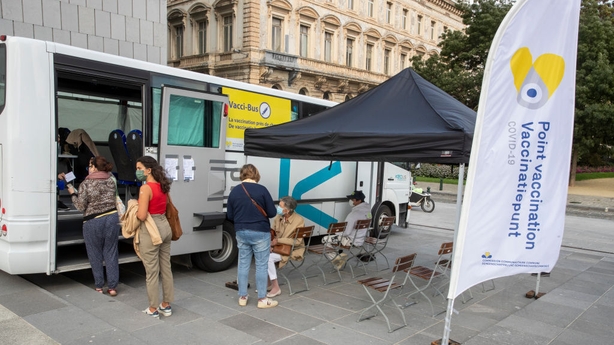
While there will be no restrictions on the number of people seated together at a table and no restrictions on social distancing, diners and cafe-goers will still have to wear masks.
Restrictions and mask-wearing requirements for indoor events with up to 200 people and up to 400 people for outdoor events will be removed.
Only events that exceed these numbers will be opened to people who have been vaccinated and have a negative virus test or have recovered from the virus.
Nightclubs will be allowed to reopen on October 1.
72% of Belgium’s population have received at least one dose of the vaccine, compared to 62% of young people aged 12 to 17, according to official figures.
The data showed that Belgium had 1.16 million confirmed cases, 25,312 deaths and 77,129 patients hospitalized.
Sydney imposes partial curfew as Covid cases rise
Sydney has extended its two-month lockdown for another month and imposed a partial curfew, as Australia’s largest city struggles to contain the outbreak of the fast-spreading coronavirus.
New South Wales Premier Gladys Berejiklian announced the «difficult» decision and told the city’s five million residents that it was time to «vaccinate».
«Unfortunately, the case numbers continue to grow,» she said. «This is what life will look like for most of us through the end of September.»
For most of the pandemic, Sydney has seen very few cases of the virus.
But the city is now reporting more than 600 cases each day — straining contact tracing efforts — and that number shows little sign of shrinking.
Stay-at-home orders will now remain in effect across the city until the end of September, and residents of virus hotspots will also be subject to a nighttime curfew and limited to one hour of outdoor exercise per day.
About 1,000 members of the Defense Force are helping police enforce the restrictions, as weary residents increasingly break the rules.
With the death toll steadily rising and the virus spreading to regional areas, Australia is racing to get a blow at arms.
Currently only 30% of the population is fully vaccinated.
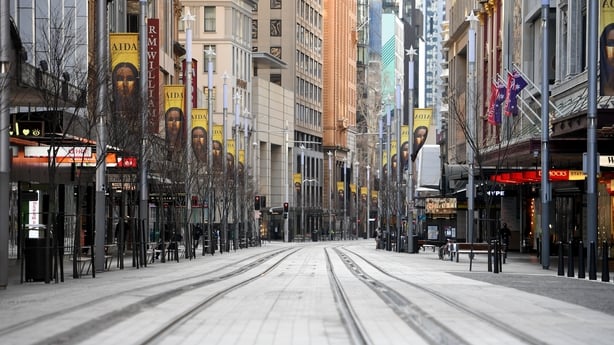
Meanwhile, there are growing concerns about vulnerable Indigenous communities in remote New South Wales, where the virus is now spreading.
All residents of Wilcania – a small town surrounded by many ancient Aboriginal sites – were asked to take the tests after the funeral was identified as a super-widespread event.
A spokesperson for the local health ministry said officials are going door to door urging local residents to get tested for the virus, while a sports stadium has been converted into a testing site.
Early in the pandemic, Wilcania residents put up signs at the city limits asking travelers not to stop – fearing the virus could wipe out an already vulnerable community.
Authorities in New South Wales are also facing growing anger from other Australian states, where cases of the virus linked to the Sydney outbreak have emerged.
The Israeli Prime Minister receives a dose of a booster vaccine
Israeli Prime Minister Naftali Bennett received a third dose of the Covid vaccine from Pfizer/Biontech, after Israel extended its booster campaign for people over 40 in a bid to curb the delta coronary type.
New cases in Israel have surged since Delta emerged, and Bennett, 49, has sought to avoid a national lockdown by increasing the third doses.
People over the age of 60 began receiving the third doses in July, before the minimum age of eligibility was dropped to 50.
Health Ministry officials noted weak immunity and high infection rates in the Delta.
The health department said the boosters will now be given to people over 40 whose second shot was at least five months ago.
She recommended teachers, health workers and caregivers of older adults and pregnant women of all ages to get the shot.
«If you get vaccinated with a third shot, we will be able to avoid a fourth lockdown,» Bennett said before appearing live on social media receiving the vaccine. He said Israel would share its data.
More than 1 million of Israel’s 9.3 million residents have received a third dose, which an Israeli healthcare provider said was 86% effective in preventing infection.
Israeli health officials said they are seeing early indications that the booster campaign may be slowing the rate at which cases are rising.
Jamaica announces coronavirus lockdown with health system on edge
Prime Minister Andrew Holness said Jamaica will ban residents from leaving their homes for seven days spread over three weekends to contain a surge in coronavirus cases and protect its health care system.
The Caribbean nation is battling a third wave of infections, with a highly contagious delta type confirmed on the island.
«Our case numbers are unacceptably high and increasing, and the rate of hospitalization is exceeding – and I want to stress that – beyond the capacity of our health system to cope,» Holness said in a virtual press conference.
More than 550 people have been hospitalized with Covid-19 in a country of about three million people. So far, nearly 60,000 people have been infected with the coronavirus and more than 1,300 have died.
Officials are concerned about the spread of the disease, with an average seven-day positivity rate of 39%. The rate rose after authorities eased containment measures last month.
«The situation is not so good right now, and we’re really going to have to take some serious measures to bring the numbers down quickly,» said chief medical officer Jacqueline Bisasur McKenzie, who also spoke at the press conference.
Holness said Jamaica will begin its restrictions on movement tomorrow, with the first lockdown lasting for three days. There will be a similar three-day ban on movement the following weekend, and a one-day closure on Sunday, September 5.
Jamaicans will be required to stay at home unless they are essential workers, although there will be some flexibility for citizens with international travel plans, or vaccination appointments.
The country’s vaccination efforts have been slow, with only 5% of the population fully vaccinated.
Vietnam’s largest city issues stay-at-home order as Covid-19 deaths rise
Ho Chi Minh City, the Vietnamese business hub, announced that its residents will be prevented from leaving their homes, as the country’s largest city turns to drastic measures to slow the spiraling coronavirus death rate.
The hardest order in Vietnam so far comes amid a spike in deaths and infections, despite weeks of lockdown measures aimed at limiting movement in the city of 9 million people, the epicenter of the country’s outbreak.
«We are asking people to stay where you are, not go out. Every home, business or factory should be a fortress to fight viruses,» said the city’s deputy head of the Corona Virus Control Authority.
Details of the order, which will go into effect on Monday, have yet to be announced.
It is hoped that restricting movement will reduce infection and give authorities an opportunity to focus on treating critically ill patients.
Vietnam has been slow to buy vaccines and until late April had one of the best containment records in the world, with just 35 deaths and fewer than 3,000 cases as of May 1.
But that has since jumped to more than 312,000 cases and 7,150 days, with about half of infections and 80% of deaths in Ho Chi Minh City alone.
Testing and vaccination will continue on demand.
More than half of Ho Chi Minh City’s residents have received at least one dose of the Covid-19 vaccine, but the national vaccination rate is among the lowest in Asia.
South Korea extends social distancing rules
Its prime minister said South Korea has extended its restrictions on social distancing by two weeks amid an increase in Covid cases, while allowing vaccinated people some freedom.
The country’s fourth wave of Covid-19 has shown few signs of abating after six weeks of stricter level four distancing rules, which include a ban on gatherings of more than two people after 6 p.m. in the greater Seoul area.
South Korea’s Disease Control and Prevention Agency data showed that South Korea reported 2,052 new cases yesterday, of which 1,2001 were locally acquired.
As part of the expanded restrictions, authorities will require restaurants and cafes in the metropolitan area to close an hour earlier from 9 p.m. until September 5, Prime Minister Kim Bo-kyeom said at a Covid response meeting.
Mr Kim said that in the same area, where previously only two people could gather after 6pm, one or two more fully vaccinated people can now join them, 14 days after the last shot.
Sun Young-rae, a senior health ministry official, said restaurants and cafes accounted for 30% of the recent cluster of Covid-19 outbreaks.
The health ministry said workers in high-risk facilities such as saunas, indoor gyms, karaoke bars and private academies will have to take polymerase chain reaction (PCR) tests every two weeks.
These incentives are meant to encourage vaccinations and boost the economy, especially hospitality companies that have been hit hard by the prolonged measures.
South Korea has given 48.3% of its population of 52 million people at least one dose of the vaccine, and 21.6% have been fully vaccinated. It aims to have fully immunized 70% by October.
With the help of vaccinating the elderly and the weak, the country has not seen a significant increase in deaths related to Covid, with the death rate reaching 0.94%, but the number of critical and critical cases is on the rise, reaching 385 as of yesterday.

«Lector profesional. Jugador galardonado. Aficionado a los zombis. Adicto a las redes sociales. Experto en tocino. Erudito en Internet»
